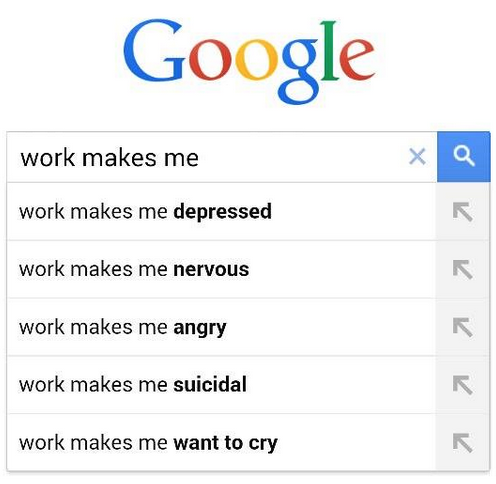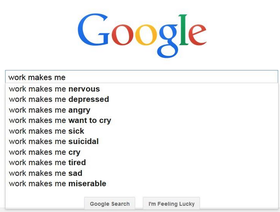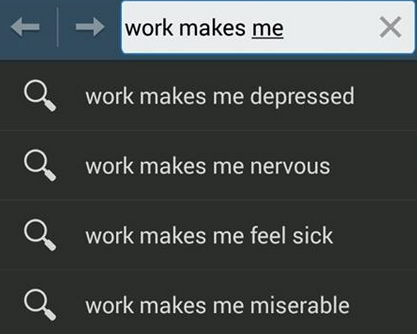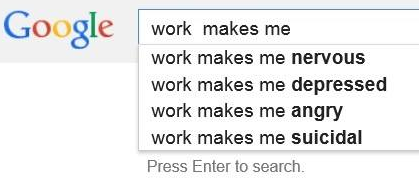Last week, Arianna Huffington wrote about what happens when you type "why am" into Google's search engine and allow it to autocomplete your sentence. The results point to an incredibly overtired society. When I saw this, I got curious... I believe that in today's world, we are all working longer, always connected, and that it leads to personal stress and causes loss of productivity at work.
So I wondered, what are the most common searches related to how work makes us feel? I typed "work makes me" into my google search and here's how Google auto-completed my search: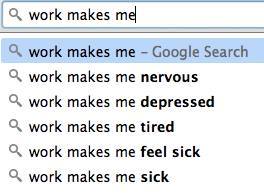
As I expected, not too positive. Then I started wondering whether there are differences across thr world, so I reached out to some of my global Facebook friends.
Friends in India, Spain, Vancouver, Winnipeg, Yukon Territories, Bulgaria and Ireland all found similar results.
The results of this (albeit unscientific) study point to the toxicity of work for many. It doesn't seem to matter where in the world you're from, the size of your community, or the type of work you do. People everywhere are feeling that work is making them nervous, depressed, angry, miserable, sick and at its worst, suicidal.
This needs to change. In a world where studies say we're working an average of 72 hours per week, and that 70 percent of us are not fully engaged, leaders need to take a good look at how we are leading people and managing work.
Imagine work that makes you feel energized, excited and purposeful.
Here are a few simple steps leaders can start taking now to make a difference for themselves and their teams.
- Encourage down time.
For most of us, there is no urgent need to reply to emails when we are with our family and friends, enjoying life outside work. "Crazy busy" has become a badge of honor, our constant connected ness with our mobile devices demonstrating the importance of our job and how needed we are. Leaders need to demonstrate switching off and to beware of what they are reinforcing. Encourage breaks, disconnectedness and time to think and to enjoy life.
Have you ever asked the people in your organization what their job is? If their response is tactical and activity-based, they may not realize how they impact the organization's mission and vision. For that matter, do your vision and mission statement inspire purpose or are they written as corporate speak? If your strategy speaks only to things like profitability or being "leaders in your industry", it may not inspire purpose in most of your people. How does your organization make a difference to the people it serves? Consider a re-write and working with everyone to realize how they contribute.
Many leaders feel a need to show strength in all things, to cover up vulnerability, and to avoid discussions about feelings. Vulnerability and authenticity build trust and trustworthiness within teams. One step towards increased authenticity is to have your entire team complete and share the results of a behavioral assessment like DISC, Meyers-Briggs, or any of the many others on the market. When we share our strengths, limitations and fears, and ask for help with the things that our out of our natural wheelhouse, we increase understanding, teamwork and the feeling of worth especially for those different from ourselves.
Once you've identified the natural strengths in your team members, it's time to work to strengths. Consider how work is delegated across your team. If you have a team member who has a natural analytical style who is constantly out of her comfort zone, selling to people for example, consider ways to redistribute work. When you're starting a project, ask team members what sort of work they like to do and are best at. Rather than delegating based on people's job functions, delegate based on the type of work that gives them energy.
I believe that change is possible. What do you think?

